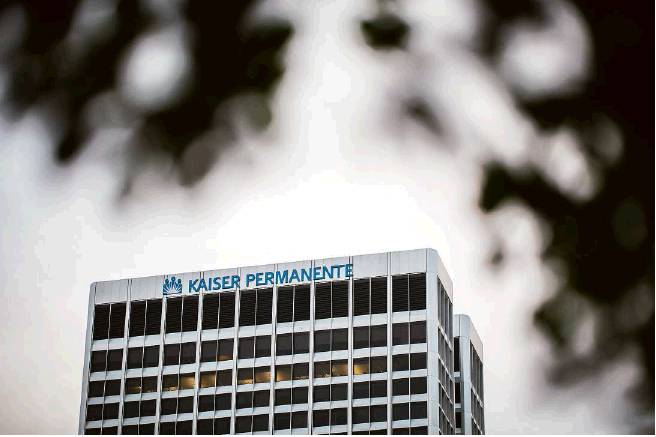OPEN FORUM On Martin Luther King Jr. Day
Black mental health matters, too
By Sabrina Chaumette
As a Black mental health therapist at Kaiser Permanente, I’ve always felt ashamed every year when I offer my Black patients an appointment on Martin Luther King Jr. Day.
They’ll ask me why I’m working, and when I tell them that it’s not a paid holiday at Kaiser, they’ll ask, “How can Kaiser do that?”
This year, those of us who provide mental health services for Kaiser in Oakland and Richmond won’t be working on Martin Luther King Jr. Day. We’ll be striking — not only because Kaiser went back on its word to finally make Martin Luther King Jr.’s birthday a paid holiday for us, but because Kaiser still refuses to address structural racism within its ranks and work with us to provide appropriate care for all marginalized communities.
In Oakland, a city where 1 in 4 people are Black, Kaiser has only five Black mental health therapists on its adult team.
Even though we provide mental health care, it feels like we’re the MASH unit.
According to a 2019 report from the Substance Abuse and Mental Health Services Administration, Black adults in the U.S are more likely than their white counterparts to report persistent symptoms of emotional stress. Despite the need for mental health care, the same report found only 1 in 3 Black adults receive it.
Poverty also plays a role.
The EveryOne Counts! 2019 Homeless Count and Survey found that while Black people make up 24% of the city’s population, they make up 70% of the shelterless population. And this was the situation before COVID-19. Since the start of the pandemic, Black people have disproportionately felt the brunt of the virus, contracting it at far higher rates than white people due in no small part to these longstanding underlying racial inequities.
I appreciate that my department supports patients by asking them if they want to work with therapists who can provide culturally responsive care. When there’s a police shooting in the community, my caseloads go up. And I know why. As a Black person with three Black sons, I understand what it means to be so afraid. But at Kaiser, we just don’t have the numbers to provide that needed care for Oakland’s Black community. Because Kaiser mental health clinics are so understaffed, my next available intake appointment is in four months.
As a Black mental health therapist, I have to navigate my own experiences of racism while bearing the brunt of holding my community’s collective trauma. It’s a responsibility I cherish. but it’s also a difficult burden to shoulder. I’ve had anxiety attacks when our team lost a Black therapist. But I knew they truly had to go because they had done the best they could, and they couldn’t do it anymore. They had to take care of themselves.
I do everything I can to help my patients. I come in early, stay late, book them when I should be doing my paperwork or give them five minutes of phone coaching — anything to help them feel connected to me.
But it’s a terrible burden knowing that you can’t provide your patients the care they need.
That’s why last year, following the murder of George Floyd, my colleagues in Oakland and Richmond reached out to Kaiser management about finally taking action to address structural racism and help support clinicians of color and provide better mental health care to patients of color.
The only thing Kaiser executives agreed to do was finally make Martin Luther King Jr. Day a paid holiday for mental health clinicians in 2022. And last month, Kaiser broke that promise, informing us that its recognition of the King holiday was “an unfortunate misunderstanding.”
I cried in a staff meeting when I got the news. It felt like a slap in the face to the community we serve and to us as Black health care professionals. It’s a decision that tells Kaiser’s patients and its employees that we’re not going to honor Black lives — that everything Kaiser says about racial justice is just lip service.
Last week, Kaiser CEO Greg Adams sent an email to workers announcing that Kaiser will finally make Martin Luther King Jr. Day a paid holiday for all Kaiser employees — but not until 2023, nearly 40 years after it became a federal holiday and more than a decade after our union, the National Union of Healthcare Workers, first requested it.
It’s hard to believe that Kaiser would have taken that action if we hadn’t already announced that we were striking on Martin Luther King Jr. Day this year. And, it’s hard for us to believe that Kaiser will take any significant steps to improve conditions for therapists and patients of color if we don’t keep up the pressure.
Part of King’s legacy is the work he did to desegregate our hospitals and our health care. At a news conference in 1966, in connection to the annual meeting of the Medical Committee for Human Rights, he noted, “Of all the forms of inequality, injustice in health is the most shocking and inhuman.”
If I left Kaiser, there would only be four Black therapists treating adults in Kaiser’s Oakland clinics. My patients already wait so long to see me; I can’t walk out on them now.
When will Kaiser show that same commitment to its therapists and patients of color and for mental health overall? When will it stop breaking its promises; when will it stop paying lip service to civil rights and stand behind its words that Black Lives Matter? We can’t wait till next year anymore.
Sabrina Chaumette is an Oakland resident and a licensed clinical social worker at Kaiser Permanente, where she has worked for 14 years.
